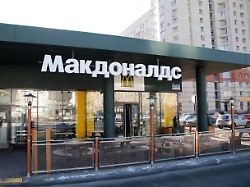Exodus of foreign investors
This is how Russian billionaires benefit from the Ukraine war
2/10/2023 1:58 p.m
After the departure of large international companies, Russia has to fill many gaps in order to keep the economy afloat. The hour has come for Putin’s oligarchs, provided they are not on a sanctions list. They invest – because the Kremlin boss wants it and bargains lure.
The Russian corporate landscape is being reorganized. Many foreign companies, from Exxon to McDonald’s, have turned their backs on the country over the past year because of the invasion of Ukraine. There are big gaps in the economy. For the first time in decades, second-tier Russian entrepreneurs in particular have the chance to conquer bastions in the economy that were previously in the firm hands of large top dogs, writes the finance portal Bloomberg.
Russian entrepreneurs are “under political pressure to buy assets from exiting investors,” but they also have the opportunity to “acquire assets cheaply,” the portal quoted Chris Weafer, head of Macro Advisory. There are plenty of options. A total of 830 international companies have turned their backs on Russia as a result of the Ukraine invasion, according to a listing by the Yale School of Management. Of them, 335 have completely withdrawn – including German companies such as Aldi, Daimler and DB Schenker.
Russian investor and founder of several large companies Ivan Tavrin is among those who are seizing the moment. For a year now, the 46-year-old has been investing heavily in foreign companies whose owners want to leave the country. Tawrin’s advantage: he belongs to the circle of well-known sanctioned oligarchs, such as Alisher Usmanov. However, his name is not on any of the three sanctions lists. Usmanov, now the fifth richest person in the country, is on the US, EU and UK sanctioned lists. The companies of the respective countries are forbidden to do business with him.
Oligarchs on a shopping spree
Tawrin’s Kismet Capital Group had bought an independent cell phone infrastructure operator just months before Russia invaded Ukraine. It is not known whether the investment in transmission masts has paid off. The two Scandinavian telecom equipment suppliers Nokia and Ericsson, which operated almost half of the base stations in Russia and covered a wide range of products, have meanwhile also left the Russian market and left a vacuum.
Since the war broke out, the Moscow entrepreneur has invested another $2.3 billion in tech companies, which he says have been worthwhile. Tawrin bought the Russian classifieds business Avito from Dutch Prosus, one of the world’s largest technology investors, as well as an online recruitment platform whose shareholders include Goldman Sachs.
At $2.1 billion, Avito was a steal. Before the Ukraine war, the company was valued three times as much. The deal was financed by the Russian Agricultural Bank, which is controlled by the Bank of Russia. It benefits from an exemption from sanctions imposed because it plays a key role in financing food exports. Tawrin was less fortunate in his ambitions to buy Russia’s McDonald’s restaurants. Here he did not get a chance.
Insider: Oligarch negotiates with VW
Meanwhile, the exodus of international companies from Russia continues. Volkswagen is now also considering a complete withdrawal from Russia. After the VW plant in Kaluga, one of Russia’s richest people, the founder and majority owner of the Sistema conglomerate, Vladimir Evtushenkov, is said to be licking his fingers. Talks between the oligarch and the German carmaker about a purchase are said to be already underway. Although Yevtushenkov’s name is on the UK’s list of sanctioned persons, that shouldn’t be an obstacle for an EU company.
Overall, Russia is coping better than expected with the sanctions imposed by the West. Money and domestic investors appear to be in place after a year of war in Ukraine. “In the short term, there definitely seems to be a Russification of the business landscape,” Bloomberg quoted Liana Semchuk, an analyst at British consulting firm Sibylline. Kremlin boss Vladimir Putin has succeeded in getting money from the business elite back into the country and thus mitigating the consequences of the sanctions. For the billionaires, however, there is also a downside to the coin: There are not many signs “that these businessmen will be able to achieve the same level of prosperity and freedom that they had before the war”. Bargain or no bargain, Russia’s economy is heavily dependent on Western technology. And because of the sanctions, supplies are faltering.
